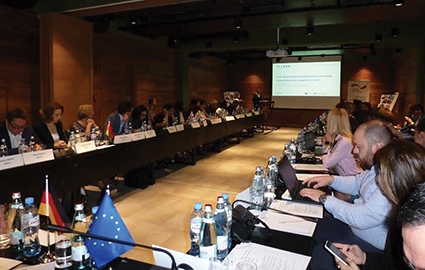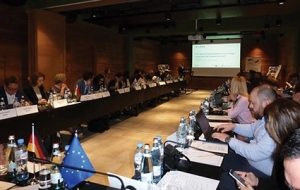German Society for Int’l Cooperation Hosts E-Governance Conference
Getting a new passport can be a real pain if your country doesn’t have the necessary infrastructure. Losing a passport a couple of days before flying off to a different country exacerbates the situation heavily.
For two days, Tbilisi was the location of an international working Conference for EU’s Eastern Partnership member states to discuss new ideas and innovations for e-governance.
Over 50 international experts from the EU, Germany, Georgia, Armenia, Azerbaijan, Belarus, Ukraine, and Estonia are exchanging their experiences in sectors such as electronic services and monitoring, smart city, and electronic engagement.
“The International Conference aimed at establishing an effective international exchange network along with future cooperation in the field of e-governance in the EU Eastern Partnership countries. During the conference, cooperation plans will be discussed. The Conference format also hosts workshops for groups and issues related to the introduction of innovative technologies in the field of service delivery in participating countries,” announced GIZ, the German Society for International Cooperation prior to the event.
Funded by the German Federal Ministry of Economic Cooperation and GIZ, the conference, from 17 – 18 April was held in Tbilisi , as Georgia is the leading country in the sector with the newly constructed House of Justice as an exemplar of an efficient bureaucracy.
“Electronic services for citizens operate on a one-window basis in a transparent and high-quality manner, which is oriented towards citizens. Georgia is often visited by delegations of different countries to get a first-hand understanding of such models of effective service delivery. The success of Georgia in this field stems from the impeccable management, which Georgia implemented together with the construction of the House of Justice,” the GIZ explains the state-of-the-art public building in the center of Tbilisi.
All other partner countries aim at implementing similar infrastructure projects to achieve more efficient government agencies. Decentralization, transparency, and citizen-oriented services are the key focus areas in the field and are supported by the conference, as high official civil servants are able to exchange their project ideas with other states. The goal is that at the end of the conference, the respective governments are equipped with the necessary knowledge to implement new administrative reforms.
Estonia, which has managed to become a global forerunner in e-governance matters, participated at the conference to share its implementation process with other states. Hannes Astok, Head of the e-Governance Academy (eGA), an Estonian consulting firm specializing in the advancement of e-governance across the globe, oversaw the conference while lending a helping hand to the different government representatives. According to Astok, the two days should spur the communication between the different governments. “The main task is to learn from each other. The most valuable aspect is if the various people responsible for the implementation of e-governance between the countries can communicate and stay in touch to help each other’s implementation process. Secondly, the participants learn what has been achieved in other states and how it was implemented. This allows governments to avoid making the wrong decisions, while aiding them in their search for the appropriate means of implementation. We want to convey the message that states do not need to act alone,” Astok notes, going on to emphasize that the best outcome is the set up of joint-projects run by multiple government actors from different members states of the EU Eastern Partnership, thus spurring the parallel implementation process in numerous countries.
The wider public is usually unaware of the fact that only 20% of e-governance is due to the appropriate technology, as this is the only thing they see on their online interface. However, Astok notes the importance of organization as the driving factor of efficient e-governance systems, pointing to the importance of governments exchanging their implementation processes.
The different nation-states often struggle with similar issues and obstacles to allow further digitalization of their citizen services. Government officials from older generations grapple to see the advantaged of e-governance, or purposely navigate around them. “It would basically eliminate corruptive schemes on multiple levels if transactions were conducted online. Fewer bribes are good for every country,” Astok says.
Governments are also hesitant to use the necessary capital to transform bureaucracy into an e-governance process, as they only see the costs. “Although it costs something initially, thousands of businessmen and individuals save hours of time otherwise spent on paperwork. This impact is huge, as often a digital process requires ten minutes of time, whereas going to the government office to get a new passport may require hours, counting the time used for public transport and queuing. Such an increase in efficiency translates into much higher tax revenues, eliminating the initial costs,” Astok says as he tries to convince governments.
Unfortunately, he notes, the deciding factors are often the people around such projects. If the political capital doesn’t exist, no implementation will happen. Every country has lobbies hoping to avoid digitalization as they profit from a system based on physical signatures. “Lufthansa is a very interesting company as they profit from flying people first-class across the country to sign paperwork,” laments Astok.
The most advanced countries in the field have the support of key politicians and often operate in super governmental agencies, which try to calibrate the entire political system, crossing ministry lines.
In the end, it all depends on the political support. Great examples of specific country projects are Ukraine’s attempts for smart cities or Azerbaijan’s improvements of service deliveries, which is based to a great extent on the Georgian House of Justice. Although many government representatives attended the conference, the goal is to help the business sector to increase their efficiency through various schemes, such as a reduction of the time needed for registering a business.
Georgia proves to be a great example in the region, according to Astok, but there are still ways to improve the efficiency. “A new project called ‘Business House’ is trying to achieve similar results for SMEs as the House of Justice does already for the wider public. However, why create a physical building again? It would be easily possible to digitalize the entire process online, removing the need for businesses to travel across the city for paperwork,” states Astok.
By Benjamin Music












